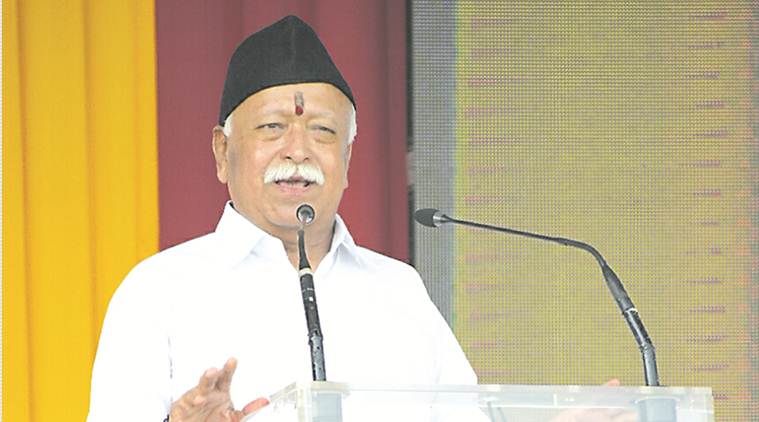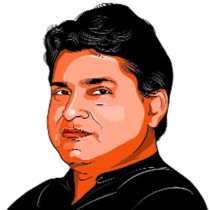Make-over or make-up?
Mohan Bhagwat’s new RSS is likely a tactical response in anticipation of change.

The Sangh favours the pro Congress-yukt-Bharat leader for the next term than a pro Congress-mukt one. (File)
The recent lecture series by RSS chief Mohan Bhagwat has puzzled many, from ordinary swayamsevaks to Sangh antagonists. Has the Sangh changed? That’s the puzzle. Knowing what the Sangh has stood for all these years, the answer can’t be guaranteed as affirmative. The Sangh isn’t known to have ever explicitly admitted to being wrong. At most, it has chosen to say that it is like a flow that finds its way through turns and twists, ups and downs. It has always proudly maintained it has survived through many difficult times and has grown into a huge organisation due to its innate strengths, including its openness to change whenever required. But it is never known to have admitted to its mistakes directly, least of its positions on core issues.
So, why is the Sangh saying it is doing away with the core thoughts, exemplified in second Sarsanghchalak M S Golwalkar’s Bunch of Thoughts that abhorred Muslims, Christians and Communists as “dangerous” for the country? Why is it saying that it considers the Constitution as the final word, unlike Bhagwat’s predecessor K S Sudarshan’s view that it doesn’t reflect Hindu ethos and hence, needs to be overhauled? Is this a genuine change of heart?
The RSS’s implicit style of functioning for several decades should alert us about the pitfalls of taking these admissions at face value. What Golwalkar and Sudarshan had said in the past is not at variance with what Bhagwat has stated, in so far as the needs of the time are concerned. The remarkable difference between the situations then and now is that the BJP wasn’t in power at all or at least not on its own. The RSS was yet to fully realise that the Hindutva narrative alone wasn’t enough to bring it to the centre stage. It was Narendra Modi, who turned to the narrative of development when he was in a spot over the 2002 anti-Muslim riots. It was Modi who brought out the importance of the mixed narrative — Hindutva and development — to the RSS’s bunch of thoughts.
Unfortunately for the RSS, the growing perception that the Modi-led dispensation is unlikely to repeat the 2014 performance has brought home an important message: A fast-depleting developmental appeal will only be accentuated by a growing strident Hindutva, which will further damage the prospects for 2019. The Sangh Parivar is fast reconciling to the perception that Modi has failed to deliver on his promises. They are aware that in 2014, a large number of non-Hindutva voters had voted for the BJP, lured to the promise of development. For these voters, Hindutva wasn’t a great concern if they would get development. But in the absence of development, all they see is the blatant exhibition of Hindutva. If this chunk of voters shifts away from the BJP, then it’s performance is sure to diminish compared to 2014. Bhagwat’s liberal avatar may stem from this situation.
So, where does the praise for Congress fit into the RSS’s new scheme? Besides adding to its well-thought-out makeover as a liberal organisation, it could also be an omen for a future detente with the party that has been targeted by its ideologues and followers over the past few years. The attempt here is to undo the damage caused by this targeting.
It is important to see this olive branch in the context of the perception that the RSS has Nitin Gadkari in mind as an alternative to Modi. Gadkari’s uncomfortable relationship with the Modi-Shah duo is no secret. As far as the ability to walk the talk on development is concerned, it is Gadkari who has earned praise from all, including the media, more than Modi. And Gadkari has made no bones of the fact that he has friends in all parties, including the Congress. In a veiled reference to the Modi-Shah duo, Gadkari recently said he doesn’t believe in retributive politics. If there is anyone in the BJP that the Congress or the Opposition hasn’t targeted during the last four years, it is Gadkari.
Days before Bhagwat delivered his lecture series, Gadkari had called on Bhagwat at Nagpur, ostensibly to greet him on his birthday. So, a message may have gone out to the Congress that the Sangh favours the pro Congress-yukt-Bharat leader for the next term than a pro Congress-mukt one. And in case the Congress comes to power, the praise will be on record to have an assuaging effect against a possible backlash.
The practical consequences of Bhagwat’s “new line” will be known only after the next year’s election results. But it is pertinent here to recount a story narrated by Nagpur-based journalist-activist Shyam Pandharipande. Pandharipande, who grew up as a swayamsevak before joining liberal social movements, had recalled in a recent article in Loksatta how a senior RSS leader, who is no more, had answered a ticklish question from a participant of third-year training camp at Nagpur many years ago. The participant asked why should it be repeated that Hindustan is for Hindus but people from other religions can follow their faith without any problem. The RSS leader replied, as Pandharipande recounts as eye-witness: We are organisationally and socially not so strong now, so we have to say this. Once we become strong, we will tell them that you have to become Hindus if you want to stay here.
Clearly, past experience doesn’t inspire confidence in anything refreshing that the RSS says.
For all the latest Opinion News, download Indian Express App
More From Vivek Deshpande
- Maha govt calls back rescue team to capture ‘man-eating’ tigress alive after Maneka Gandhi intervenesThe sudden move follows an intervention by Union Minister Maneka Gandhi, who is believed to have opposed Khan's involvement in the operation, which began last…
- No chance of capturing ‘man-eating’ tigress alive, says shooter tasked with killing the animalSixty-year-old Khan has been camping in the trouble-torn area of Pandharkawda division in Yavatmal district for last ten days following an invitation by the Forest…
- BJP, Sena must contest jointly if Cong & NCP tie up, else will face losses: CMWhen it was asked if he would go to the Union government as a minister if the party doesn't reinstate him as CM, Fadnavis said,…












.png)



























No hay comentarios:
Publicar un comentario